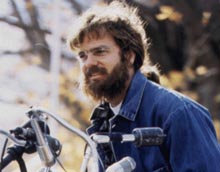
As if to apologize for a mini-series just a “sweep” ago that was surprisingly sympathetic to the sixties, NBC reverts to a more conventional demonizing in The Hunt for the Unicorn Killer (Sunday and Monday, May 9 and 10; 9 to 11 p.m.). Ira Einhorn, played by Kevin Anderson in this heavy-breathing docudrama, is everything our mothers warned their daughters about – an antiwar agitator with a Charlie Manson beard, a hippie guru who saw UFOs, a psychedelic-drug-fiend eco-freak who personally presided over the very first Earth Day, a charismatic flimflam artist, a misogynistic womanizer, a “planetary enzyme,” and a killer pacifist. That he should still be hiding out in a French village, Champagne-Mouton, known for its fine wine, its quality cognac, and its goat cheese, is merely added seasoning to a crêpe suzette of dread.
Like the mini-series, the book by Newsweek’s Steven Levy from which it is adapted, and a Philadelphia court that tried Einhorn in absentia, I’m assuming that he murdered Holly Maddux (Naomi Watts) in 1977. It is, of course, remotely possible, as he claims, that the CIA framed him – by breaking most of Holly’s bones, including her skull; stuffing her body in a steamer trunk; and letting the corpse rot for eighteen months in a locked closet in Ira’s very own apartment while he was off wowing co-eds at Harvard – after which, despite the best advice of Arlen Specter, his defense attorney, he skipped a ludicrously low bail of $40,000 and fled the country. But then there’s the previous girlfriend whom he almost strangled when she sought to leave him. And isn’t it more likely that the agency, predisposed as it has been to paranormal phenomena, LSD experiments, and computer geekiness, would have tried to hire the guy instead?
That low bail, by the way, was courtesy of Ira’s supportive and influential friends, from a corporate heavy (Josef Sommer) who thought he could cash in on Ira’s futurist fantasies to a police lieutenant (Bill MacDonald) who used the radical poseur to defuse potential student riots, not to mention Barbara Bronfman (Mimi Kuzyk), Edmund Muskie (John Bayliss), and Uri Geller (Yuval Daniel). Not so supportive and much less influential were Holly’s father (Tom Skerritt), her sisters (Kellie Overbey and Kristin Booth), the private detective they hired to find out what happened to her (William G. Schilling), and her post-Ira Fire Island boyfriend (Brian Kerwin). While it may be true that upon his arrest, Ira was told that “a hippie Jew who killed a blonde shiksa cheerleader” didn’t stand a chance, the fact is that almost everybody in Philadelphia found Ira brilliant, and almost nobody believed he’d harm a fly.
To update you to the nineties, they finally found Ira in France, but the French refused to extradite because, under French law, convictions-in-absentia are invalid, and so Pennsylvania rewrote its own statutes to provide for a new trial, and now Ira is appealing extradition and Holly’s still dead, as are her parents. The French have a point, about which the mini-series is far too casual, even contemptuous.
To the part of Ira, Anderson, who was last seen on television as the troubled priest Father Ray in the canceled series Nothing Sacred, brings some genuine intelligence and charm, plus an Abstract Expressionist streak of the volatile-sinister, as if Abbie Hoffman were looking over his shoulder at a Unabomber who seemed to be gaining on him. As Holly’s father, Fred, Skerritt is an open wound from which the will to live is seeping. (He diminishes before our eyes; that he will shoot himself is preordained in shadowy wince.) As Holly, “Miss Congeniality” of Tyler, Texas, Watts isn’t asked to be much more than blonde and wholesome, naïve and vulnerable, in need of a vacation and a therapist. (In the sixties especially, bad things happened to good girls.) To every minor role, character actors contribute a surprising conviction and the welcome sense of being more complicated than they can briefly suggest. And William A. Graham directs by crosscutting as if his condo were on fire. Nevertheless, it’s Family Values versus Sixties Excess. We have graduated in a single generation from the bogeyman of the Vietnam vet turned sociopath to the bogeyman of the antiwar radical turned Bluebeard. The killer pacifist is as tailor-made for the Culture Wars as the killer lesbian and the killer baby-sitter.